Vascular: Mesenteric Ischemia
Mesenteric Stenosis/Ischemia
Basics
- Visceral Perfusion Fails to Meet Organ Metabolic Requirements
- More Common in Women (3:1)
- Can Be Complicated by Bowel Necrosis
- Mucosa is Affected First Due to Higher Metabolic Demand
Types
- Acute Mesenteric Ischemia (AMI) – Rapid Over Hours-Days
- Most Common Cause: Arterial Emboli
- Chronic Mesenteric Ischemia (CMI) – Slow Over Weeks-Months
- Most Common Cause: Atherosclerosis
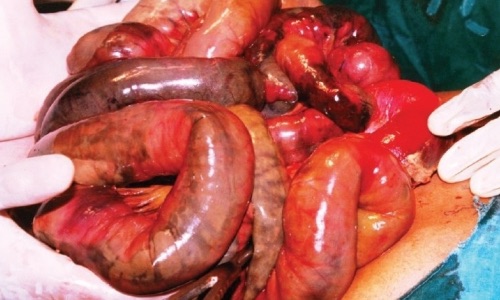
Necrotic Bowel from Mesenteric Ischemia 1
Acute Mesenteric Ischemia
Causes
- Arterial Disease
- Arterial Embolism
- Most Common Cause of Acute Mesenteric Ischemia (40-50%)
- Most Common Source: Heart
- Most Common Site: SMA Just Distal to Middle Colic Artery
- Anatomy:
- SMA Has a Decreased Angle of Takeoff Compared to Other Mesenteric Vessels
- SMA Begins to Narrow After Middle Colic Takeoff
- Spares Proximal Jejunum & Transverse Colon
- Anatomy:
- Arterial Thrombosis
- Second Most Common Cause of Acute Mesenteric Ischemia (20-35%)
- May Have History of Chronic Mesenteric Ischemia & “Food-Fear”
- Most Common Site: SMA Origin
- Involves Entire Distribution
- Higher Mortality Than Arterial Embolism
- Arterial Embolism
- Mesenteric Venous Thrombosis
- Classification:
- Primary – Idiopathic
- Secondary – From Underlying Process
- More Common (90%)
- Causes: Injury, Venous Stasis or Thrombophilia
- Often Vague & Less Dramatic
- Classification:
- Non-Occlusive Mesenteric Ischemia (NOMI)
- Ischemia Without Associated Thromboembolic Occlusion
- Causes:
- Decreased Perfusion from Low Cardiac Output (Most Common)
- Systemic Vasopressors & Hemodialysis Increase Risk
- Hypovolemia
- Cocaine-Induced Vasoconstriction
- Decreased Perfusion from Low Cardiac Output (Most Common)
- Most Vulnerable Sites: Watershed Areas
- Often More Insidious Onset than Arterial Disease
- Highest Mortality Rate – Association with Multi-Organ Failure
Presentation
- Abdominal Pain – Most Common Symptom
- Sudden & Severe
- “Pain Out of Proportion” – Patient Reports Significant Abdominal Pain That Does Not Correlate to Physical Exam Findings with Only Mild Abdominal Tenderness
- Bloody Diarrhea (Sudden & Forceful)
- Nausea & Vomiting
- Abdominal Distention
- Fever
Diagnosis
- Dx: CTA
- Mesenteric Duplex US Poor in Acute Setting – Obscured by Bowel Gas & More Operator Dependent
Initial Managements
- Aggressive Fluid Resuscitation
- Aggressive Electrolyte Correction
- Heparin (Not Necessary for NOMI)
- Broad-Spectrum ABX (High Risk for Bacterial Translocation)
- If Unstable or Peritonitis: Exploratory Laparotomy & Resection of Necrotic Bowel
- Resect Areas of Complete Ischemia Before Embolectomy or Revascularization (Risk of Infection)
- Reevaluate Areas of Partial Ischemia After Embolectomy or Revascularization
- Low Threshold for Open Abdomen & Second Look if Bowel Viability is Questioned
Definitive Treatment
- Arterial Embolus: Open SMA Embolectomy
- Uses a Proximal Transverse Arteriotomy
- Balloon Catheter Inserted Proximally & Distally to Extract Embolus
- May Consider Endovascular Embolectomy in Select Stable & Nonperitoneal Patients
- Arterial Thrombosis: Open SMA Bypass
- Bypass Route:
- Right Common Iliac Artery to SMA – Preferred Route
- Retrograde in “Lazy-C” Configuration
- Left Common Iliac Artery
- Infrarenal Aorta – Higher Risk of Kinking Given Shorter Graft
- Antegrade Supraceliac Bypass – More Difficult Dissection
- Only If Diseased Infrarenal Aorta & Iliacs
- Right Common Iliac Artery to SMA – Preferred Route
- Graft Options:
- Synthetic Graft – Preferred
- Better Patency, Size Match, Easier Handling & Kink Resistant
- Autogenous Vein
- Preferred if Bowel Necrosed or with Peritoneal Spillage
- Synthetic Graft – Preferred
- If Both Celiac & SMA Diseased: Use Bifurcated Prosthetic Conduit to Both
- Bypass Route:
- Mesenteric Venous Thrombosis: Heparin & Lifelong Anticoagulation
- Non-Occlusive Mesenteric Ischemia (NOMI): Improve Circulatory Support & Catheter-Directed Intra-Arterial Vasodilators to SMA
- Vasodilators: Nitro, Papaverine or Prostaglandin E1 (PGE1)
Endovascular Treatment
- Generally Avoided in Acute Mesenteric Ischemia Due to Concern for Bowel Ischemia Requiring Surgical Evaluation
- May Consider if Poor Surgical Candidate & No Sign of Bowel Necrosis
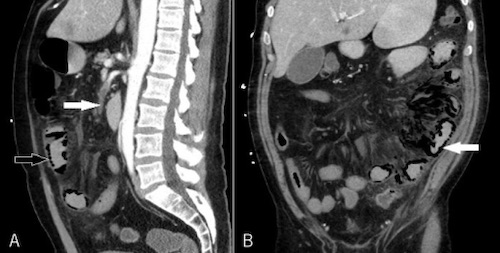
Mesenteric Ischemia with Embolism on CTA 2
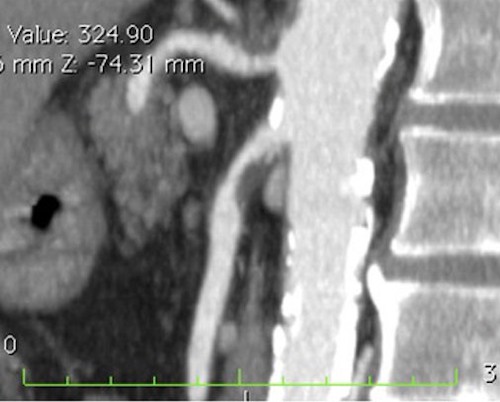
Mesenteric Ischemia from SMA Stenosis on CTA 3
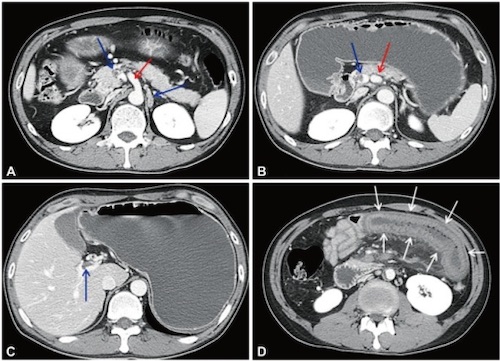
Mesenteric Venous Thrombosis on CTA – SMV Thrombus (Blue Arrows), Intact SMA (Red Arrows), Edematous Jejunum (White Arrows) 4
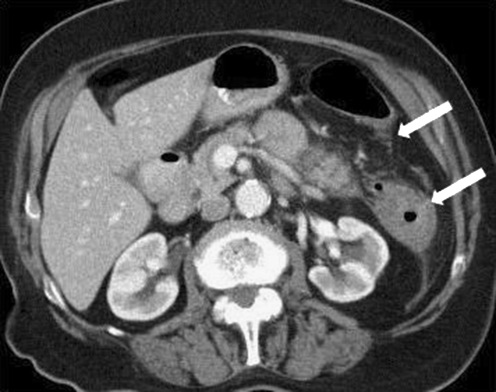
NOMI with Ischemia at Griffith’s Point 5
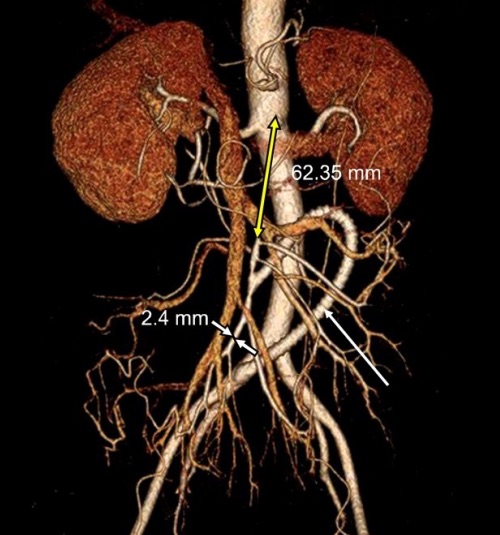
SMA Bypass with C-Loop Graft 6
Chronic Mesenteric Ischemia
Basics
- Most Common Cause: Atherosclerosis
- Risk Factors:
- Smoking
- Hypertension
- Hyperlipidemia
- More Common in Elderly Cachectic Females
- Due to Rich Collateral System Symptoms Typically Only Develop Once ≥ 2 Vessels (Celiac/SMA/IMA) are Significantly Stenosed
Presentation
- Postprandial Abdominal Pain (Intestinal Angina)
- Pain Causes “Food Fear” & Weight Loss/Malnutrition
Diagnosis
- Screening: Mesenteric Duplex US
- Assess Celiac & SMA; IMA Difficult to Visualize
- Peak Systolic Velocity (PSV) Defining Values Not Clearly Defined
- Moneta Criteria Indicating ≥ 70% Stenosis:
- SMA PSV ≥ 275 cm/s
- Celiac PSV ≥ 200 cm/s
- Dx: CTA or MRA
- Gold-Standard: Angiography – More Often Used for Planned Treatment than for Diagnostics
Treatment
- Indications for Revascularization:
- All Symptomatic Patients Should Be Treated
- Asymptomatic Severe 3-Vessel Disease
- Primary Tx: Endovascular Balloon Angioplasty & Stenting
- If Anatomy Unfavorable: Consider Open Revascularization/Bypass
- Often Require Preoperative Nutrition Optimization
References
- Zachariah SK. Adult necrotizing enterocolitis and non occlusive mesenteric ischemia. J Emerg Trauma Shock. 2011 Jul;4(3):430-2.(License: CC BY-NC-SA-3.0)
- Clores MJ, Monzur F, Rajapakse R. Acute Mesenteric Ischemia Caused by Rare Cardiac Tumor Embolus. ACG Case Rep J. 2014 Oct 10;2(1):27-9. (License: CC BY-NC-ND-4.0)
- Reginelli A, Genovese E, Cappabianca S, Iacobellis F, Berritto D, Fonio P, Coppolino F, Grassi R. Intestinal Ischemia: US-CT findings correlations. Crit Ultrasound J. 2013 Jul 15;5 Suppl 1(Suppl 1):S7. (License: CC BY-2.0)
- Kim HM, Kim HL, Lee HS, Jung JH, Kim CH, Oh S, Kim JH, Zo JH. Nonbacterial Thrombotic Endocarditis in a Patient with Bowel Infarction due to Mesenteric Vein Thrombosis. Korean Circ J. 2014 May;44(3):189-92. (License: CC BY-NC-3.0)
- Baugh CW, Levine AC, Pallin DJ. Heart block and nonocclusive mesenteric ischemia. Int J Emerg Med. 2009 Sep;2(3):171-2. (License: CC BY-NC-2.0)
- Jun HJ. Isolated bypass to the superior mesenteric artery for chronic mesenteric ischemia. Korean J Thorac Cardiovasc Surg. 2013 Apr;46(2):146-9. (License: CC BY-NC-3.0)